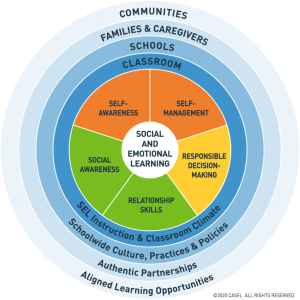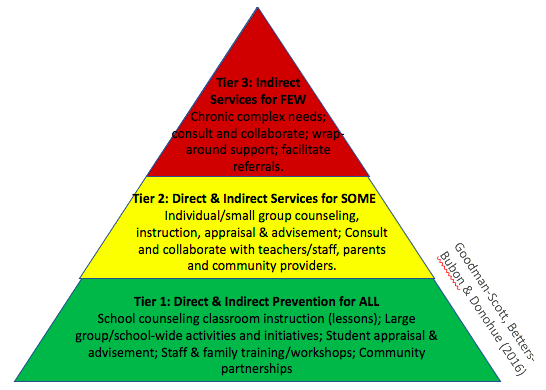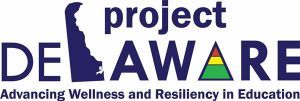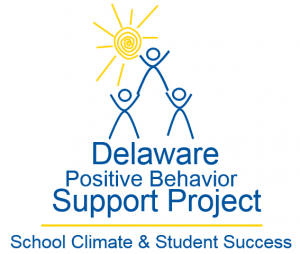2021-2022 School Year
Networking Session Dates: 10/15/21, 2/7/22, 4/8/22
10/15/21
Presentation Slides
Google Drive Materials
2/7/22
Presentation Slides
4/8/22
Presentation Slides
Networking Session Dates: 10/15/21, 2/7/22, 4/8/22
Presentation Slides
Google Drive Materials
Presentation Slides
Presentation Slides

Social-Emotional Learning (SEL) is “the process through which all young people and adults acquire and apply the knowledge, skills, and attitudes to develop healthy identities, manage emotions and achieve personal and collective goals, feel and show empathy for others, establish and maintain supportive relationships, and make responsible and caring decisions” (CASEL, 2021). Social and emotional learning provides the basis for the universal supports for behavior and wellbeing in the MTSS framework. There are 5 interrelated SEL competencies which exist across contexts and are integrated within your MTSS/SWPBIS in order to address the education of the whole child and facilitate their success in the classroom and the community. something about adult sel, child sel, relationship building, and increasing equity and resilience? To see research on the benefits of SEL and the impact of SEL on students and adults, see the CASEL website.
In oder to integrate SEL into Delaware Public Schools, a task force (Delaware SEL collaborative) was created, focused on curricular alignment, integration into existing structures such as MTSS, and framework guidance to meet schools where they are. Each of the 5 competencies was broken down and operationalized by benchmark and grade band. See the competencies by benchmark (pgs. 10-24) and by grade band (pgs. 25-38) here. Members of the Delaware Positive Behavior Support project aided with the creation of the Delaware Competencies Introductory Guide and a Delaware SEL Toolkit (coming ___).
Positive behavioral interventions and supports (PBIS) provides an ideal framework for promoting social-emotional competencies to improve outcomes for the whole child.
The SEL & SWPBIS Integration module, from DE-PBS, reviews the SEL and SWPBIS approaches, provides a rationale for integrating and aligning the two approaches, and provides practical strategies to support integration in schools. The purpose of this module is to help school professionals deepen their understanding of these approaches, how they are complementary to one another, and how they can be integrated effectively to enhance student learning and development.
This brief, from the Center on PBIS, describes how school personnel can teach social-emotional competencies within a PBIS framework to support systematic, school-wide implementation through one system, rather than trying to improve student outcomes through separate, competing initiatives.
The term ‘mental health’ refers to how we think, feel and behave; it is a critical part of our overall health (Center on PBIS, 2021). Mental health prevention is now recognized as a critical part of education, but schools struggle with how to establish a comprehensive system of mental health support. A school’s behavioral health program works best when its implemented within a tiered framework.

At Tier 1, an integrated team of school and community clinicians focus on the social-emotional and behavioral needs of all students. Data at this level include universal screening for both internalizing and externalizing concerns. Data are used to select evidence-based interventions within a continuum.
At Tier 2, those who have concerns follow a process to submit a request for assistance (see “Systems Development Tools” section here). Teams work to connect students to a range of targeted, group-based interventions. Clinicians coordinate and facilitate a continuum of supports to address social skills, problem-solving skills, and coping skills; including for those students who are experiencing anxiety, depression, and the impact of trauma.
At Tier 3, clinicians coordinate individual interventions selected by the systems team. Teams monitor fidelity data and the interventions’ impact, regardless of who implements the intervention. Ongoing coaching, including professional development and technical assistance is provided.
Education and mental health leaders understand the need to establish one system of social-emotional and behavioral supports in schools. The Interconnected Systems Framework (ISF) is a way to blend PBIS with mental health supports in schools. This framework guides state, district, and community leaders to fund and modify policies and procedures to help every system work more efficiently. Clinicians – supported by integrated district structures – become part of multi-tiered school teams to address the social-emotional and behavior needs of all students. ISF expands the PBIS framework as a way to assist teams and enhance their efforts (Center on PBIS, 2021). Visit the Center on PBIS website to learn more about ISF (DE-PBS ISF page coming soon!).

Project DelAWARE is a collaborative effort between the Department of Education (DOE), The Division of Prevention and Behavioral Health Services (DPBHS), the UD Center for Disabilities Studies (CDS), the UD Center for Drug and Health Studies (CDHS), and three local school districts – Capital School District, Colonial School District, and Indian River School District. Funding for the project is provided through a 5 year federal SAMHSA (Substance Abuse and Mental Health Services Administration) grant.
Check out the webinar resources here

We continue to compile helpful virtual resources to implement PBiS while working remotely. For an overview of what we have see: https://www.delawarepbs.org/virtual-learning-resources/
We know many caregivers are at home full time with their children. A great activity to help establish routines and behavioral expectations is to create an At-Home Matrix. Check out the steps and an example from one of our staff members, Heather Godwin. |